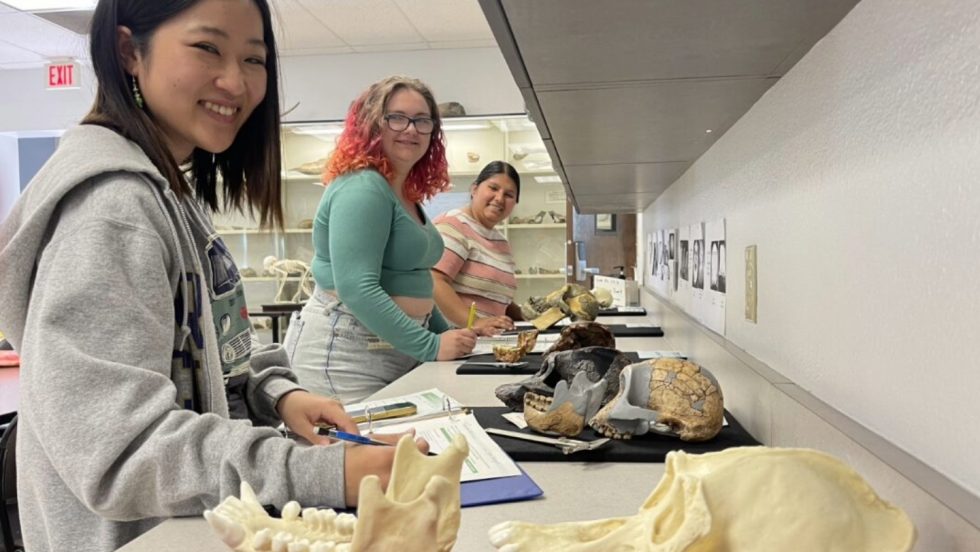Anthropology
Program Description
Anthropology is the study of humankind and what makes us human. With a focus on culture, anthropologists seek to comprehend the incredible variety of human thought and experience throughout the globe. Anthropology majors also study language use, the remnants of ancient societies, human biological variation, and so much more.
The discipline of Anthropology includes four major subfields, and several minor ones:
Cultural Anthropology is the study of human society and cultural variation.
Biological Anthropology is the study of humans as biological organisms, including human skeletons, genetics, adaptations, and evolution.
Archaeology is the study of past human societies and history through material left behind.
Linguistic Anthropology is the study of the form and social use of language.
Minor subfields include forensic anthropology, medical anthropology, urban anthropology, development anthropology, and environmental anthropology, among others.
For many interesting examples of current anthropological topics, visit Sapiens.org
Degrees/Certificates
Merced College offers the following degrees/certificates in Anthropology:
Anthropology (AA-T)
Why Study Anthropology?
Anthropology majors are everywhere! They develop unique skill sets, including direct participant observation, critical analysis and data interpretation, interpersonal and cross-cultural communication, and a holistic global perspective. These make them ever more in demand in a wide array of career fields, including academia and education, museums and conservation, cultural and historical preservation, public health, forensic science, non-governmental agencies, travel and hospitality, as well as business and management.
Many anthropology graduates use their knowledge and methodologies to work toward resolving contemporary social issues and problems. Now more than ever, the anthropological ability to understand, navigate, and empathize with the rich diversity of human social behavior is of vital importance in our shrinking, globalized world.
What Can You Do With An Anthropology Degree?
With an anthropology degree, you could find yourself pursuing any of a wide variety of careers, not just ones in academia or that have ‘anthropologist’ in the name:
Anthropologists make excellent educators and researchers. These careers usually require further education, certification, or post-graduate degrees. Careers include college professor, field researcher, laboratory researcher, grant manager, equality and diversity officer, primary or secondary school teacher, librarian, academic adviser, counselor, ESL specialist, administrator, journalist, and more.
Current and future demand for contract archaeological technicians is expected to be high in the field of cultural resources management, due to state and federal mandates. Careers include archaeologist, contract archaeologist, museum curator, conservator, archivist, historical preservation officer, docent, collections manager, state/federal parks interpreter, and more.
Anthropology majors have the skills needed to work for or with various regional, state, and federal agencies in a variety of capacities (some require post-graduate degrees). Careers include forensic anthropologist, forensic science technician, detective, social worker, parole officer, grant manager, lobbyist, refugee services administrator, legislative staff, diplomatic staff, policy analyst, natural resources manager, translator, and more.
Anthropology is a common undergraduate major for those who wish, with further training, to go into medical field careers, such as becoming a pathologist, doctor, medical examiner, or dentist, as well as careers in public health or epidemiology.
Anthropology majors often pursue careers in the public policy, legal, or public service sectors, which can include work in international development, community organizing, world literacy, human rights advocacy, migrant aid and migration policy, environmental policy, and (again) public health, working with organizations such as the United Nations, Peace Corps, World Neighbors, World Health Organization, or the USAID, to name a few.
Corporate managers want to hire anthropologists for their unique insight into people and human behavior based on participant observation, not just statistical data sets and surveys alone. Anthropologists may study the corporate culture itself, making suggestions for improvement and worker morale, they may be involved in marketing research, or they may be vital to functional and user-friendly design of products and technology. Careers include hotel manager, tour guide, tour operator, cruise director, marketing analyst, social media director, user experience (UX) researcher, public relations (PR) manager, diversity and inclusion (D&I) manager, human resources (HR) manager, tech writer, and more.
For more information and resources on careers in anthropology, including testimonial video, visit AmericanAnthro.org


Anthropology students on a field trip to the Merced Zoo.
Anthropology Faculty
-
Jeffrey Buechler
ProfessorAnthropology -
Christine A Clarkson
Lab TechnicianMath Science Engineering
